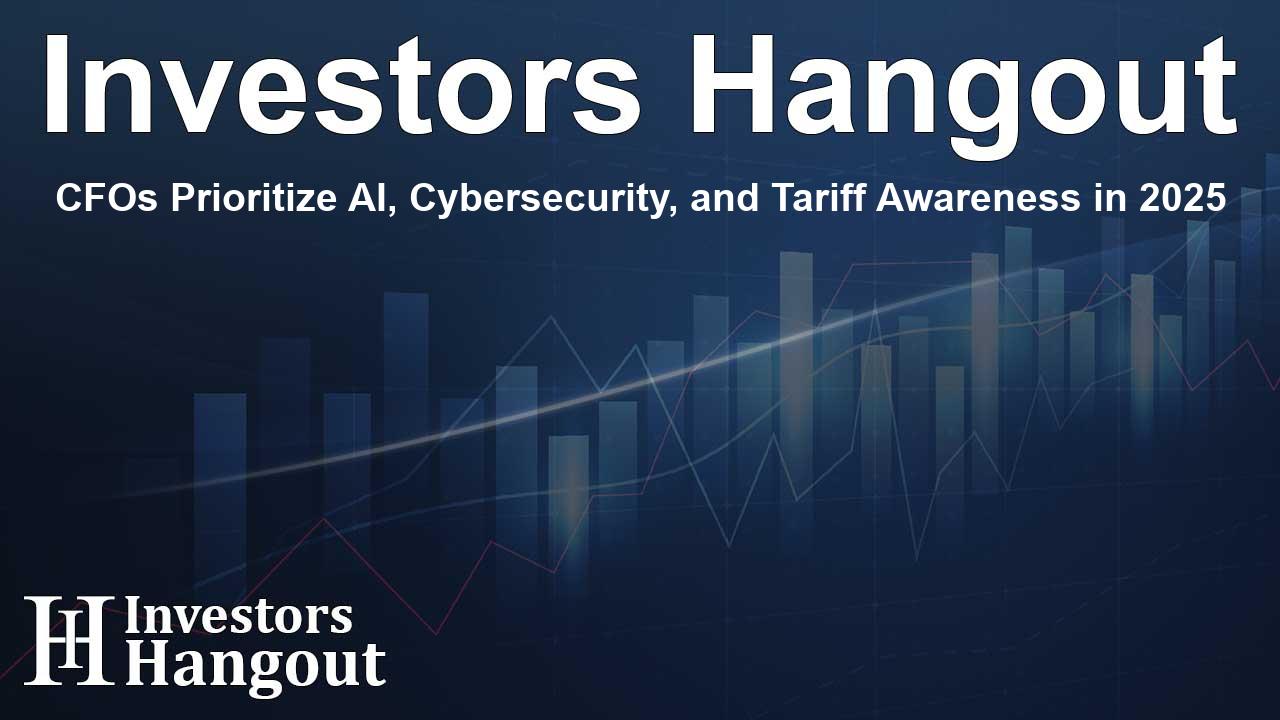CFOs Prioritize AI, Cybersecurity, and Tariff Awareness in 2025

Understanding the New Dynamics Among CFOs in 2025
A recent survey highlights that Chief Financial Officers (CFOs) are facing challenges that compel them to reassess their priorities. As tariffs and trade barriers gain prominence as pressing issues, CFOs are simultaneously urged to focus on technology adoption, including AI and cybersecurity. The need to adapt to these shifts is evident as organizations strive to maintain profitability.
Growing Concerns Over Tariffs
The 2025 survey indicates that a significant number of CFOs view tariffs and trade barriers as a top-five concern. With around 66% of CFOs fearing adverse impacts on their companies, it's clear that the external economic landscape is dramatically changing. This concern marks a notable shift from previous years where such factors were not as high on the priority list.
Shifts in Financial Leadership Priorities
The transition in priorities can be attributed to the ongoing challenges in achieving profitability. As 34% of CFOs cite profitability as their main focus, they are also grappling with issues surrounding cybersecurity and economic uncertainty. The interrelation between these factors emphasizes the evolving role of CFOs in steering their organizations through complex environments.
Strategic Response to Evolving Risks
According to Michelle Search, a national practice leader with Jefferson Wells, the role of the CFO has transformed to emphasize the importance of utilizing AI, automation, and effective talent management. In this unpredictable climate, leveraging these tools enables organizations to carve out a competitive advantage.
Impact of AI and Cybersecurity on CFO Strategies
The accelerating pace at which CFOs adopt AI and cybersecurity measures illustrates their commitment to dealing with potential threats. In fact, nearly all companies surveyed (96%) are engaging with AI in some capacity, representing a decisive shift from exploratory approaches to operational execution. This readiness reflects broader industry acknowledgment of the importance of technology in maintaining operational efficiency.
Cybersecurity as a Top Priority
Cybersecurity is now a critical focus area, with around 73% of CFOs participating in cyber strategy. The involvement of finance leaders in this domain showcases the recognition of cyber threats as pressing risks that necessitate proactive strategies. This shift under lines a broader trend toward operational preparedness rather than mere preventive measures.
Organizational Growth and Talent Management
Interestingly, the 2025 survey reveals a notable rise in headcount growth, with 45% of CFOs planning to increase their finance teams. This reflects a 19% increase from the previous year, indicating that organizations are starting to reinvest in their talent. The expanding role of finance in risk management and support for transformation projects is fostering a renewed sense of momentum in the industry.
The Future is Collaborative
The crucial takeaway from these findings is that today's CFOs are shifting away from isolated approaches and are now more inclined towards collaboration, partnerships, and integrated strategies to tackle challenges effectively. This collaborative spirit is essential, especially as finance leaders navigate through uncertainty while maintaining a sharp focus on profitability.
Embracing Change with Confidence
As CFOs adjust to the complexities of modern finance, the 2025 survey paints a picture of leaders who are shedding previous fatigue and embracing new challenges head-on. The growing importance of tariffs, alongside advancements in AI and cybersecurity, is forcing finance executives to rethink traditional strategies and adapt them to fit emerging realities.
As organizations balance the demands for profitability with the need for technological transformation, ongoing proficiency in these areas becomes not just beneficial, but vital. The journey towards integrating innovative solutions while ensuring compliance and security amidst changing regulations will undoubtedly define the future landscape for financial leadership.
Frequently Asked Questions
What were the main findings from the CFO survey?
The survey highlighted increasing concerns over tariffs, profitability, and a strong focus on AI and cybersecurity in financial management.
How are CFOs reacting to the challenges posed by tariffs?
CFOs are expressing heightened concern for the impact of tariffs, re-evaluating their compliance capabilities, and developing strategies to mitigate risks.
Why is AI adoption significant for CFOs?
AI adoption allows CFOs to enhance operational efficiency, improve decision-making, and maintain a competitive edge in an evolving market.
What role does cybersecurity play in financial strategy?
Cybersecurity is critical as CFOs increasingly engage in developing strategies to protect their organizations from rising cyber threats.
How does headcount growth reflect CFO priorities?
The increase in headcount indicates a commitment to strengthening finance teams, enhancing risk management, and supporting growth strategies.
About The Author
Contact Henry Turner privately here. Or send an email with ATTN: Henry Turner as the subject to contact@investorshangout.com.
About Investors Hangout
Investors Hangout is a leading online stock forum for financial discussion and learning, offering a wide range of free tools and resources. It draws in traders of all levels, who exchange market knowledge, investigate trading tactics, and keep an eye on industry developments in real time. Featuring financial articles, stock message boards, quotes, charts, company profiles, and live news updates. Through cooperative learning and a wealth of informational resources, it helps users from novices creating their first portfolios to experts honing their techniques. Join Investors Hangout today: https://investorshangout.com/
The content of this article is based on factual, publicly available information and does not represent legal, financial, or investment advice. Investors Hangout does not offer financial advice, and the author is not a licensed financial advisor. Consult a qualified advisor before making any financial or investment decisions based on this article. This article should not be considered advice to purchase, sell, or hold any securities or other investments. If any of the material provided here is inaccurate, please contact us for corrections.
